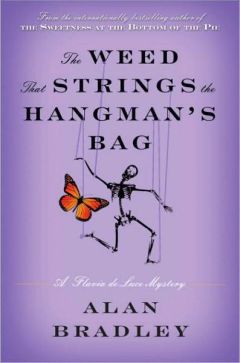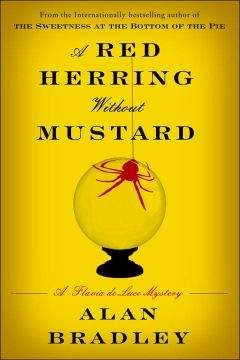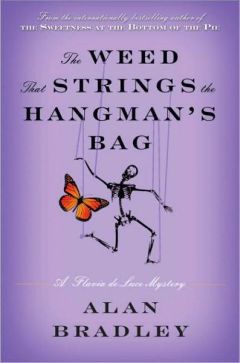Alan Bradley - The Weed That Strings the Hangmans Bag

Скачивание начинается... Если скачивание не началось автоматически, пожалуйста нажмите на эту ссылку.
Жалоба
Напишите нам, и мы в срочном порядке примем меры.
Описание книги "The Weed That Strings the Hangmans Bag"
Описание и краткое содержание "The Weed That Strings the Hangmans Bag" читать бесплатно онлайн.
A shadow flitted across my mind, but I let it pass.
"Splendid," said the vicar. "Flavia, dear, I wonder if you'd mind going along for the ride? You can show them the way."
* SIX *
OF COURSE WE HAD to go the long way round.
Had we gone on foot, it would have been no more than a shady stroll across the stepping-stones behind the church, along the riverbank by way of the old towpath that marked the southern boundary of Malplaquet Farm, and over the stile into Jubilee Field.
But by road, because there was no bridge nearby, Culverhouse Farm could be reached only by driving west towards Hinley, then, a mile west of Bishop's Lacey, turning off and winding tortuously up the steep west side of Gibbet Hill on a road whose dust was now rising up behind us in white billows. We were halfway to the top, skirting Gibbet Wood in a lane so narrow that its hedgerows scratched and tore at the sides of the jolting van.
"Don't mind my hip bones," Nialla said, laughing.
We were squeezed as tightly together in the front seat as worms in an angler's tin. With Rupert driving, Nialla and I were almost sitting on one another's lap, each with an arm across the other's shoulders.
The Austin backfired fiercely as Rupert, according to some ancient and secret formula known only to him, fiddled alternately with the choke and the throttle.
"These Inglebys, now," he shouted above the incessant string of explosions. "Tell us something about them."
The Inglebys were rather morose individuals who kept mostly to themselves. From time to time I had seen Gordon Ingleby dropping off Grace, his tiny, doll-like wife, at the village market where, dressed always in black, she sold eggs and butter with little enthusiasm beneath a striped canopy. I knew, as did everyone else in Bishop's Lacey, that the Inglebys' seclusion had begun with the tragic death of their only child, Robin. Before that, they had been friendly and outgoing people, but ever since had turned inward. Even though five years had passed, the village still allowed them their grief.
"They farm," I said.
"Ah!" said Rupert, as if I had just rhymed off the entire Ingleby family history from the time of William the Conqueror.
The van bucked and jerked as we climbed ever higher, and Nialla and I had to brace our palms against the dashboard to keep from knocking our heads together.
"Grim old place, this," she said, nodding to the dense woods on our left. Even the few flecks of sunlight that did manage to penetrate the dense foliage seemed to be swallowed up in the dim world of the ancient trunks.
"It's called Gibbet Wood," I said. "There used to be a village nearby called Wapp's Hill, until about the eighteenth century, I think, but there's nothing left of it now. The gallows was at the old crossroads at the center of the wood. If you climb up that path you can still see the timbers. They're quite rotten, though."
"Ugh," Nialla said. "No, thank you."
I decided it was best, at least for the time being, not to tell her that it was at the crossroads in Gibbet Wood that Robin Ingleby had been found hanging.
"Good Lord!" Rupert said. "What in hell is that?"
He pointed to something dangling from a tree branch — something moving in the morning breeze.
"Mad Meg's been here," I said. "She picks up empty tins and rubbish along the roads and strings them on bits of cord. She likes shiny things. She's rather like a magpie."
A pie plate, a rusty Bovril tin, a bit of silver from a radiator shell, and a bent soup spoon, like some grotesque Gothic fishing lure, twisted slowly this way and that in the sun.
Rupert shook his head and turned his attention back to the choke and the throttle. As we reached the peak of Gibbet Hill, the motor emitted a most frightful bang, and with a sucking gurgle, died. The van jerked to a halt as Rupert threw on the hand brake.
I could see by the deep lines on his face that he was nearly exhausted. He pounded at the steering wheel with his fists.
"Don't say it," Nialla said. "We have company."
I thought for a moment she was referring to me, but her finger was pointing through the windscreen to the side of the lane, where a dark, grimy face peered out at us from the depths of a hedgerow.
"It's Mad Meg," I said. "She lives in there somewhere — somewhere in the wood."
As Meg came scuttling alongside the van, I felt Nialla shrink back.
"Don't worry, she's really quite harmless."
Meg, in a tattered outfit of rusty black bombazine, looked like a vulture that had been sucked up by a tornado and spat back out. A red glass cherry bobbed cheerfully from a wire on her black flowerpot hat.
"Ay, harmless," Meg said, conversationally, at the open window. "'Be ye therefore wise as serpents, and harmless as doves.' Hello, Flavia."
"These are my friends, Meg — Rupert and Nialla."
In view of the fact that we were crammed together cheek-by-jowl in the Austin, I thought it would be all right to call Rupert by his Christian name.
Meg took her time staring at Nialla. She reached out a filthy finger and touched Nialla's lipstick. Nialla cringed slightly, but covered it nicely with a tiny counterfeit sneeze.
"It's Tangee," she said brightly. "Theatrical Red. Changes color when you put it on. Here, give it a try."
It was a magnificent job of acting, and I had to give her top marks for the way in which she disguised her fear with an open and cheery manner.
I had to shift a bit so that she could fish in her pocket for the lipstick. As she held it out, Meg's filthy fingers snapped the golden tube from her hand. Without taking her eyes from Nialla's face, Meg painted a broad swathe of the stuff across her chapped and dirty lips, pressing them together as if she were drinking from a straw.
"Lovely!" Nialla said. "Gorgeous!"
Again she reached into her pocket and extracted an enamel powder compact, an exquisite thing of flame orange cloisonne, shaped like a butterfly. She flipped it open to reveal the little round mirror in the lid, and after a quick glance at herself, handed it over to Meg.
"Here, have a look."
In a flash, Meg had seized the compact and was scrutinizing herself in the glass, turning her head animatedly from side to side. Satisfied with what she saw, she rewarded us with a broad grin that revealed the black gaps left by several missing teeth.
"Lovely!" she muttered. "Smashing!" And she shoved the orange butterfly into her pocket.
"Here! — " Rupert made a grab for it, and Meg drew back, startled, as if noticing him for the first time. Her smile vanished as suddenly as it had appeared.
"I know you," she said darkly, her eyes fixed on his goatee. "You're the Devil, you are. Aye, that's what's gone and happened — the Devil's come back to Gibbet Wood."
And with that, she stepped backwards into the hedgerow and was gone.
Rupert climbed awkwardly out of the van and slammed the door.
"Rupert — " Nialla called out. But rather than going into the bushes after Meg, as I thought he would, Rupert walked a short distance up the road, looked round a bit, and then came slowly back, his feet stirring up the dust.
"It's only a gentle slope, and we're no more than a stone's throw from the top," he reported. "If we can push her up as far as that old chestnut, we can coast down the far side. Might even start her up again. Like to steer, Flavia?"
Although I had spent hours sitting in Harriet's old Phantom II in our coach house, it had been always for purposes of reflection or escape. I had never actually been in control of a moving motorcar. Although the idea was not unattractive at first, I quickly realized that I had no real desire to find myself hurtling out of control down the east side of Gibbet Hill, and coming to grief among the scenery.
"No," I said. "Perhaps Nialla — "
"Nialla doesn't like to drive," he snapped.
I knew at once that I had put my foot in it, so to speak. By suggesting that Nialla steer, I was at the same time suggesting that Rupert get off his backside and push — withered leg and all.
"What I meant," I said, "was that you're probably the only one of us who can get the motor started again."
It was the oldest trick in the book: Appeal to his manly vanity, and I was proud to have thought of it.
"Right," he said, clambering back into the driving seat.
Nialla scrambled out, and I behind her. Any thoughts I might have had about the wisdom of someone in her condition pushing a van uphill on a hot day were instantly put aside. And besides, I could hardly bring up the subject.
Like a flash, Nialla had darted round behind the van, pressing her back flat against the rear doors and using her powerful legs to push.
"Take off the bloody hand brake, Rupert!" she shouted.
I took up a position beside her and, with every last ounce of strength that was in me, dug in my feet and pushed.
Wonder of wonders, the stupid thing began to move. Perhaps because the puppet paraphernalia had been unloaded at the parish hall, the greatly lightened van was soon creeping, snail-like but inexorably, up towards the peak of the hill. Once we had it in motion, we turned round and shoved with our hands.
The van came to a full stop only once, and that was when Rupert threw in the clutch and turned on the ignition. A tremendous black backfire came shooting out of the tailpipe, and even without looking down, I knew that I would have to explain to Father the destruction of yet another pair of white socks.
"Don't let the clutch in now — wait until we get to the top!" Nialla shouted.
"Men!" she muttered to me. "Men and their bleeding exhaust noises."
Ten minutes later we were at the crest of Gibbet Hill. In the distance, Jubilee Field sloped away towards the river, a gently rolling blanket of flax of such electric-blue intensity that it might have caused van Gogh to weep.
"One more good heave," Nialla said, "and we're on our way."
We groaned and we grunted, pushing and shoving against the hot metal, and then suddenly, as if it had become weightless, the van began moving on its own. We were on the downside of the hill.
"Quick! Jump in!" Nialla said, and we ran alongside as the van picked up speed, bucketing and bumping down the rutted road.
We jumped onto the running board, and Nialla threw open the door. A moment later we had collapsed, hugging one another, into the seat as Rupert manipulated the engine controls. Halfway down, as the motor started at last, the van gave off an alarming backfire before settling down to an unhealthy coughing. At the bottom of the hill, Rupert touched the brakes, and we turned neatly into the lane that leads to Culverhouse Farm.
Overheated from its exertions, the Austin stood sputtering and steaming like a leaky teakettle in the farmyard, which, to all intents and purposes, seemed to be abandoned. In my experience, whenever you arrived at a farm, someone always came out of the barn to greet you, wiping his oily hands on a rag and calling to a woman with a basket of eggs to bake some scones and put the tea on. At the very least, there should have been a barking dog.
Although there were no pigs in evidence, a weathered sty at the end of a row of tumbledown sheds was full of tall nettles. Beyond that was a turreted dovecote. Assorted milk pails, all of them rusty, lay scattered about the yard, and a lone hen picked halfheartedly among the weeds, watching us with its wary yellow eye.
Rupert climbed out of the van and slammed the door loudly.
"Hello?" he called. "Anyone here?"
There was no reply. He walked past a battered chopping block to the back door of the house and gave it a thunderous knocking with his fist.
"Hello? Anyone at home?"
He cupped his hands, peering in through the grimy window of what must once have been the buttery, then motioned us out of the van.
"Odd," he whispered. "There's someone standing in the middle of the room. I can see his outline against the far window." He gave the door a couple more loud bangs.
"Mr. Ingleby," I called out, "Mrs. Ingleby, it's me, Flavia de Luce. I've brought the people from the church."
There was a long silence, and then we heard the sound of heavy boots on a wooden floor. The door creaked open upon a dark interior, and a tall blond man in overalls stood blinking in the light.
I had never seen him before in my life.
"I'm Flavia de Luce," I said, "from Buckshaw." I waved my hand vaguely in its direction to the southeast. "The vicar asked me to show these people the way to Culverhouse Farm."
The blond man stepped outside, bending substantially in order to get through the low doorway without banging his head. He was what Feely would have described as "indecently gorgeous": a towering Nordic god. As this fair-haired Siegfried turned to close the door carefully behind him, I saw that there was a large, faded red circle painted on the back of his boiler suit.
It meant he was a prisoner of war.
My mind flew instantly back to the wooden block and the missing axe. Had he chopped up the Inglebys and stacked their limbs like firewood behind the kitchen stove?
What a preposterous thought. The war had been over for five years, and I had seen the Inglebys — at least Grace — as recently as last week.
Besides, I already knew that German prisoners of war were not particularly dangerous. The first ones I had seen were on my first-ever visit to a cinema, the Palace, in Hinley. As the blue-jacketed captives were marched by their armed guards into the theater and seated, Daffy had nudged me and pointed.
"The enemy!" she had whispered.
As the lights went down and the film began, Feely had leaned over and said, "Just think, you'll be sitting with them in the dark for two hours. Alone ... if Daffy and I go for sweets."
The film was In Which We Serve, and I couldn't help noticing that when HMS Torrin was sunk in the Mediterranean by the Luftwaffe's dive-bombers, although the prisoners did not applaud the deed openly, there were nevertheless smiles among them.
"Captured Germans are to not be treated inhumanely," Father had told us when we got home, quoting something he had heard on the wireless, "but are to be shown very clearly that we regard them, officers and men, as outcasts from the society of decent men."
Although I respected Father's word — at least in principle — it was clear that the man who had greeted us at Culverhouse Farm was no outcast; not by any stretch of the imagination.
Five years after the coming of peace, he could only be wearing his bull's-eyed boiler suit out of pride.
"May I present myself? I am Dieter Schrantz," he said, with a broad smile, shaking hands with each of us in turn, beginning with Nialla. From those four words alone, I could tell that he spoke nearly perfect English. He even pronounced his own name the way any Englishman would have done, with hard rs and as and no unpleasant snarling of his surname.
"The vicar said that you should come."
"Bloody van broke down," Rupert said, jerking his head towards the Austin with, I thought, a certain measure of aggressiveness. As if he ...
Подписывайтесь на наши страницы в социальных сетях.
Будьте в курсе последних книжных новинок, комментируйте, обсуждайте. Мы ждём Вас!
Похожие книги на "The Weed That Strings the Hangmans Bag"
Книги похожие на "The Weed That Strings the Hangmans Bag" читать онлайн или скачать бесплатно полные версии.
Мы рекомендуем Вам зарегистрироваться либо войти на сайт под своим именем.
Отзывы о "Alan Bradley - The Weed That Strings the Hangmans Bag"
Отзывы читателей о книге "The Weed That Strings the Hangmans Bag", комментарии и мнения людей о произведении.






